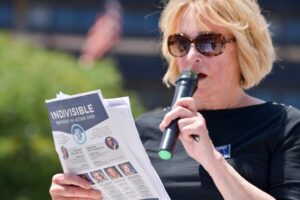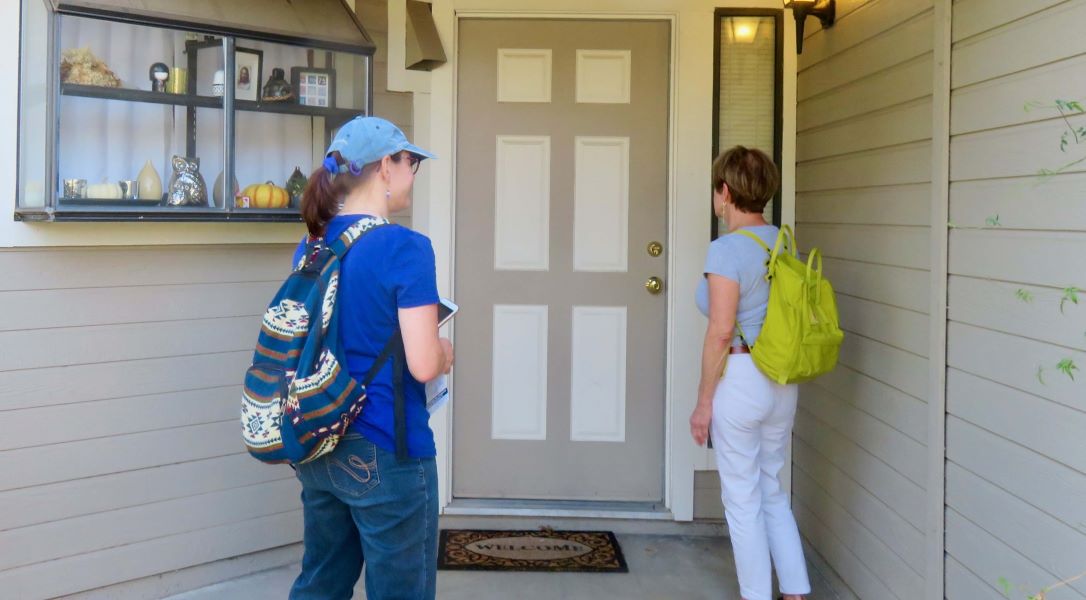There are a lot of newfangled ideas about how to get people voting in low-voting America: Texting, emailing, calling, sending postcards, even shaming (usually via some sort of tech). But it’s the old-fashioned standby that has proven, time and again, to be the most effective, even in our increasingly technological age: The personal touch.
That includes knocking on doors, reaching out to friends and neighbors, having conversations with people about the upcoming elections, who’s running and why it matters—otherwise known as canvassing. In the words of Columbia University political scientist Donald Green, co-author of Get Out The Vote: “Personal contact—an authentic invitation to vote by someone who makes you feel that your voice matters—remains the most powerful method of voter mobilization.”
“We ask people how they’re feeling after the last several years, listen to what’s on their mind and ask if they’re aware of the election coming up,” says Miller. “Research shows that voting begets more voting. So if we can convince someone to vote in the primary election, they are more likely to vote in the general election.”
That’s the thinking behind Indivisible Philly’s 35 Doors Project, which is recruiting volunteers to knock on 35 of their neighbors’ doors as a way to systematically increase turnout among progressive voters in Philly. The goal is to reach Democratic, Independent or non-affiliated voters who have infrequently cast a ballot over the last several elections; ensure they are registered; and urge them to vote in 2022’s important mid-term elections for governor and senator.
“We ask people how they’re feeling after the last several years, listen to what’s on their mind and ask if they’re aware of the election coming up,” says Vicki Miller, who launched Indivisible Philly in 2017. “Research shows that voting begets more voting. So if we can convince someone to vote in the primary election, they are more likely to vote in the general election.”
Getting voters to the polls
As in every election year, getting out the vote in Philly—nay, in America—is an uphill battle. In the last mid-term election, in 2018, about 53 percent of registered Philadelphians cast a ballot for governor and senator—a record high, likely as a result of Donald Trump’s presidency. The next year, just 23 percent voted in the Democratic primary to (effectively) re-elect Mayor Jim Kenney; in 2021, when District Attorney Larry Krasner was up for reelection, just 21 percent voted. Those are appalling numbers.
And this year, with both control of the Senate and the state’s chief executive up for grabs—not to mention state reps and even committee people—the stakes are, as always, high. Like, really high.
Miller says the group so far has recruited 33 volunteers throughout the city, who have signed up to visit 3,625 households—so far more than 35 each—with more signing up each week. So far, she estimates the group has reached about 5,800 infrequent voters this spring. (Only Democrats and Republicans can vote for candidates in the primary, so the outreach for the rest revolves around educating them for November.)
Indivisible Philly is a branch of the national progressive activist organization, which Miller came upon while searching for some way to respond to the 2016 presidential election. A former stay-at-home mom, medical technologist and—after attending law school in her 40s—16-year litigator at Morgan Lewis, Miller was then semi-retired and running a wine tasting events company. She had always voted; she made calls for President Obama, and knocked on doors until the polls closed at 8 pm for Hillary Clinton. But after Donald Trump became president, she decided even that wasn’t enough.
Miller launched Indivisible Philly in January 2017, by emailing 25 of her friends and inviting them to a meeting at her Graduate Hospital home. From there, the group took off—friends inviting friends; others finding their way through Indivisible’s national website, or encountering them and signing up at events.

Today, Miller has a steering committee—members are from their 30s to their 60s, a broader range than many other Indivisible groups, Miller notes—and she sends out a newsletter two to three times a week to a list of 11,400 people, including several hundred active members. They show up to rallies—like 1,500 at a Count Every Vote event the day after the 2020 election—and to write postcards, volunteer to organize events, attend programs ranging from climate and gun control informationals to candidate forums, and to do canvassing as elections approach. While Indivisible national offers grants and materials for some projects, most of Miller’s work is funded through donations.
The door-to-door approach
When Covid hit, the group’s events went online—but the GOTV work didn’t stop. It was 2020, after all, with the biggest presidential election in at least a generation at stake. Miller and her team couldn’t safely do in-person canvassing, so they pivoted to postcards. By November, Miller says, about 1,800 Indivisible Philly volunteers had written well over 500,000 postcards to infrequent voters—from encouraging people to register and to vote by mail, to reminding them to send in their ballots.
The work paid off: Miller says of the 44,500 registration postcards the group sent in 2020, around 5.7 percent of recipients actually registered—around 2,500 people. And of those, an overwhelming number actually voted.
After the 2020 election—well, after a short rest following the 2020 election—Miller started planning next steps, which led her to read in a book about a group in Oregon called 35 Doors Project, which over a series of years had seen increased voter turnout in the neighborhoods where they operated.
It works like this: Volunteers sign up here, then attend an online training—or pre-recorded version—about how to have the sort of conversations that can convince people about the importance of voting, something known as Deep Canvassing. For Indivisible, those conversations start with open-ended questions about how a resident is feeling after everything we’ve been through the last few years, Covid, President Biden.
“Then we sit back and listen and take it from there,” Miller says. “You can agree on the part you agree on. Or you can respond with, Where did you read that? And correct the record if you need to.”
As a Democratic organization, Indivisible volunteers are given talking points about Pres. Biden’s American Rescue Act and other Covid-related relief efforts, explaining, for instance, that it involved more than just checks for Americans. After the primary, they will also get talking points about the Democratic candidates for governor and senator.
Indivisible forms its list of target households from the state’s voter rolls, and aims to give volunteers doors in their neighborhoods to knock on. But Miller says they have volunteers from outside the area too, including several from New York. Now, she says, groups outside the city—in the Northwest, Hershey, Delaware and Montgomery counties—have called her to help them form 35 Doors Projects in their communities as well.
Miller herself has not taken on any canvassing this time around, but says she is often impressed by Philadelphians, whether they are voters or not: “Philadelphians I have talked to are very well-informed,” she notes. This is about taking that information—and undoubtedly the opinions—and turning it into actual votes.
It is, also, an opportunity to turn the personal touch into a relationship with neighbors, community members, other citizens who are—whatever their political experience or leanings—often worried about the same local issues, cleaning up the same sidewalks, facing the same joys and fears.
As Jessie Bacon, a 35 Doors volunteer says in a promo for the project: “It’s 35 chances to have meaningful interactions with your neighbors, which is a rare jewel in this day and age.”
![]() RELATED STORIES ABOUT ELECTIONS AND VOTING FROM THE CITIZEN
RELATED STORIES ABOUT ELECTIONS AND VOTING FROM THE CITIZEN




